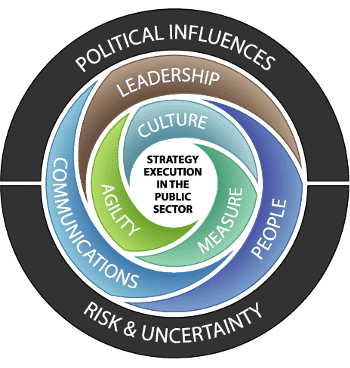Chess is often used as a symbol or example of strategy – and for good reason. The metaphor for chess goes beyond the level of the game as a format for strategy. Chess is also a metaphor for strategy execution and can be used to explain the importance of culture in the execution of strategy, regardless of whether that strategy execution is taking place in chess or by your organization in the corporate arena.
Strategy Execution Process
“The heart of execution lies in three processes: the people process, the strategy process, and the operations process.” (Bossidy L., Charan R.; Execution)
The “people process,” noted above, is one of the most critical elements in strategy execution because an organization is comprised of people and people make the culture – in both chess and business.
In chess, players face each other with the same pieces and options for movement under the same conditions or competitive environment. Both players want to win and have the same resources to use – including, theoretically, the same standard strategies used in the chess world. They can move their pieces according to a strategy, thinking one or more moves ahead, with each move aligned with the one before and the one to come, while considering their opponent’s options. If all things were equal, winning a game would be much more difficult, with stalemates the norm instead of the occasional outcome.
Questions About Strategy Execution
This raises a question about strategy and execution: what is it that gives competitors the edge to beat opponents with the same level of technical knowledge and material resources? What helps one competitor handle the pressure of taking the right action at the right time, or make a better decision about when to use (or not use) a certain strategy? Using the analogy above for business, two competing companies making the same product in the same industry with the same resources at their disposal have equal chances of success, yet time after time one business out does the other with its strategy execution. In other words, one (competitor or organization) executes better than the other.
That differentiator is culture, which is the driving force within an organization comprised of the attitudes, attributes and ability of the people executing the strategy.
To people who view strategy as a static “thing” developed by senior corporate officials and only being for large organizations, below is a brief “thumbnail” of what strategy involves to fully understand the impact of culture on the organization.
“Strategy is defined as a plan of action to achieve a goal or goal set” (Rollinson R., Young E.; Strategy in the 21st Century)
So, once you and your team (or you, in a sole proprietorship) have developed your strategy, what do you do with it? Keeping the definition above in mind, you/your team develop a list of the objectives to be accomplished to realize the strategy. That list can be referred to as the strategic operating plan.
How to execute strategy?
All right then; now that you have an operating plan, you need to execute it. To do that, you must explain to your team members what the strategy means to your organization (communication), explain why it is important to them (influencing), and ensure that all departments understand that they need to do the right things at the right time (alignment).
Once execution of the operating plan starts, it will be important for the execution teams to measure the performance of the execution activities to make sure it (the operating plan) stays on track and that the right tasks are being done by the right people with the right materials (resource management) at the right time for the right cost. The alignment activities described above are executed throughout the organization at all levels.
For the Project Management Professionals reading this blog, those objectives are most likely the priorities you would be working on. This means many of the factors that make culture important to the strategy execution process apply to project management and execution – especially the requirement to engage at all levels of the organization. Successful engagement is critical to maintaining alignment of execution activities and is dependent on a strong and consistent culture.
To once again quote authors Bossidy and Charan from Execution talking about the importance of having a culture of execution excellence:
“To understand execution, you have to keep three key points in mind:
- Execution is a discipline, and integral to strategy.
- Execution is the major job of the business leader.
- Execution must be a core element of an organization’s culture.”
How Competitors Use Strategy Execution & Resources
In business (like in chess), the difference is how each competitor uses their resources. In chess, there are known strategies – offensive and defensive move combinations that are known and studied by chess players at all levels. Yet, in a game between two players with the same level of strategy knowledge and the same resources under the same conditions, only one of them will win.
How the players use those resources is determined by how well they are equipped to handle stress and determine and react to their opponent’s moves or take initiative. The elements that make two individuals unique to themselves and their playing style is their “culture”.
Strategy Execution and Culture
Those individual differences in the business world are, in part, what constitutes organizational culture. Culture is the foundation; it is the essence of the company and is demonstrated by the actions of its employees at all levels. Culture is about people and their beliefs. If those beliefs or their sense of purpose are not in line with the organization’s, strategy execution becomes difficult.
So, what makes the difference between winning and losing? Is it the difference in the chess experience level of the two? Is it that one player handles the stress of decision-making better than the other? Can it be one player recognizes what the other player is doing? The answer is yes to all of the above. How each player uses the strategies and move possibilities available to them is what makes the difference in the game. The same idea applies to how businesses with access to the same range of resources utilize their individual resources for strategy and execution. This can make the difference between a failed business and a successful one.
Success is measured by how you accomplish your objectives…be it in life or in business. Accomplishing objectives is what successful strategy execution is all about. This applies to both a large corporation with a formal strategy, or a small business with just one strategic objective critical to its survival. Culture is the glue that binds the commitment of the team to the strategy execution.
Future articles will explain critical elements of strategy execution and provide additional details on how to develop a culture for a new business or shape the existing culture in your business to adapt to the changing world around you/your organization. Take your strategy to the next level with our training services, consulting services, and resources.
About the Author
L.J. Macko is the newest member of the LBL Strategies professional team. Going forward, Mr. Macko will lead our “Strategy Execution and Coaching” services, become a regular contributor to our blog, and serve as a member of our strategy execution instructional team. He is a strategy professional with more than 30 years of Strategic Engagement and Strategy Execution experience working in both the private and Federal Government sector. LJ served in multiple postings in the US and abroad for the US Government, working on strategic international affairs issues in partnership with US Military and Federal Law Enforcement officials in multicultural and multi-national environments.
Strategy Execution Process for the Public Sector
At LBL Strategies, we are at work creating a public sector program focused on increasing communication and leadership skills during times of organization-wide strategic transitions.

If your governmental organization’s strategies look great on paper but fall flat in execution, our ongoing research & discoveries for a new online live program will be of interest to you. We also offer a strategy course for military members who are looking to obtain strategic management certification and credentials.
Contact us today if you have any questions or are interested in scenario-based planning, strategic planning consulting services, strategy training, and strategy management.
Strategy Implementation in the Public Sector Survey: Initial Results of Public Sector Leaders co-authored by Randall Rollinson & Dr. Natalie Houghtby-Haddon.
Stay up to date on our continued research and program developments in Public Sector strategy execution.
